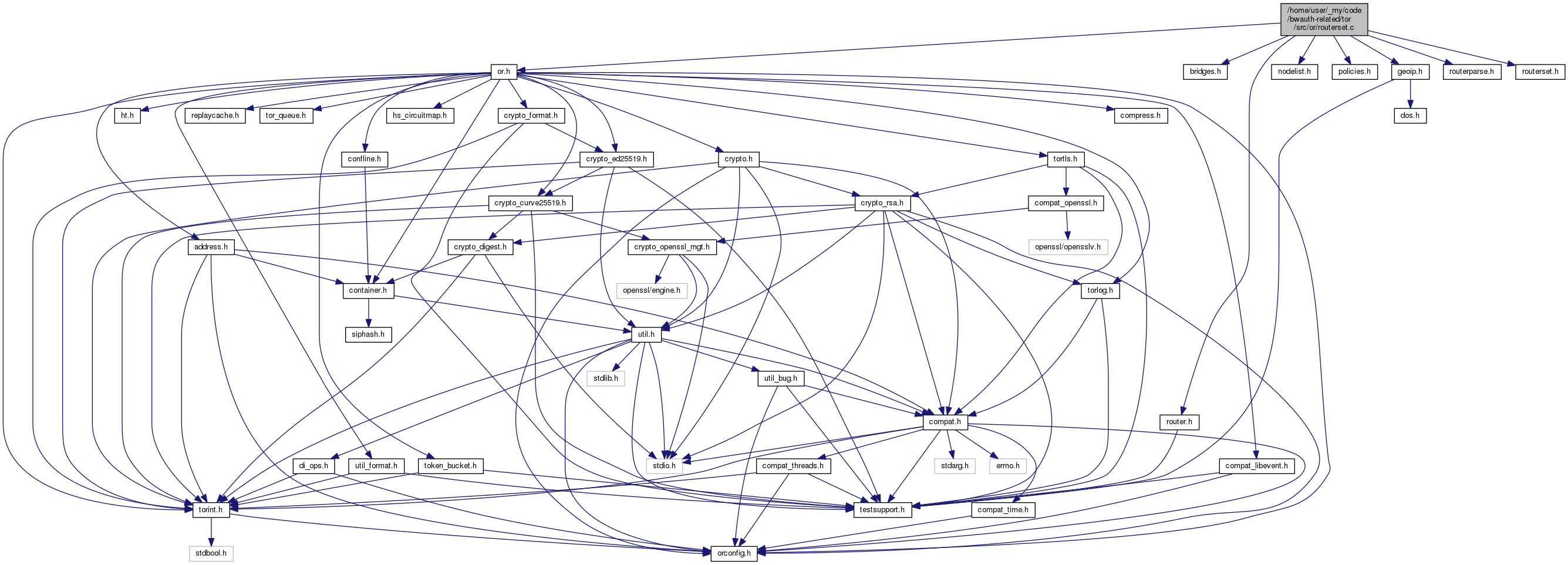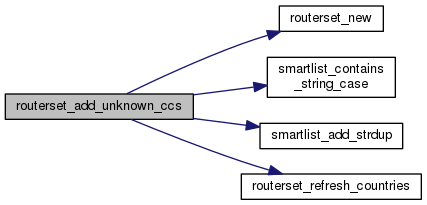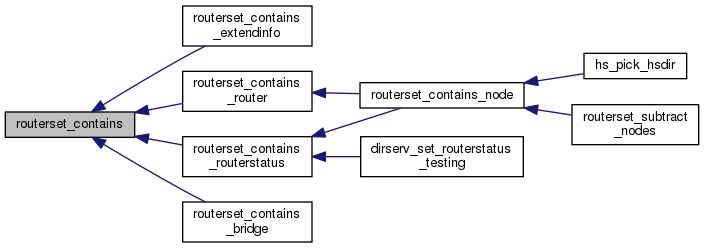Functions and structures to handle set-type selection of routers by name, ID, address, etc. More...
#include "or.h"#include "bridges.h"#include "geoip.h"#include "nodelist.h"#include "policies.h"#include "router.h"#include "routerparse.h"#include "routerset.h"
Functions | |
| routerset_t * | routerset_new (void) |
| STATIC char * | routerset_get_countryname (const char *c) |
| void | routerset_refresh_countries (routerset_t *target) |
| int | routerset_parse (routerset_t *target, const char *s, const char *description) |
| void | routerset_union (routerset_t *target, const routerset_t *source) |
| int | routerset_is_list (const routerset_t *set) |
| int | routerset_needs_geoip (const routerset_t *set) |
| int | routerset_is_empty (const routerset_t *set) |
| int | routerset_len (const routerset_t *set) |
| STATIC int | routerset_contains (const routerset_t *set, const tor_addr_t *addr, uint16_t orport, const char *nickname, const char *id_digest, country_t country) |
| int | routerset_add_unknown_ccs (routerset_t **setp, int only_if_some_cc_set) |
| int | routerset_contains_extendinfo (const routerset_t *set, const extend_info_t *ei) |
| int | routerset_contains_router (const routerset_t *set, const routerinfo_t *ri, country_t country) |
| int | routerset_contains_routerstatus (const routerset_t *set, const routerstatus_t *rs, country_t country) |
| int | routerset_contains_node (const routerset_t *set, const node_t *node) |
| int | routerset_contains_bridge (const routerset_t *set, const bridge_info_t *bridge) |
| void | routerset_get_all_nodes (smartlist_t *out, const routerset_t *routerset, const routerset_t *excludeset, int running_only) |
| void | routerset_subtract_nodes (smartlist_t *lst, const routerset_t *routerset) |
| char * | routerset_to_string (const routerset_t *set) |
| int | routerset_equal (const routerset_t *old, const routerset_t *new) |
| void | routerset_free_ (routerset_t *routerset) |
Detailed Description
Functions and structures to handle set-type selection of routers by name, ID, address, etc.
This module implements the routerset_t data structure, whose purpose is to specify a set of relays based on a list of their identities or properties. Routersets can restrict relays by IP address mask, identity fingerprint, country codes, and nicknames (deprecated).
Routersets are typically used for user-specified restrictions, and are created by invoking routerset_new and routerset_parse from config.c and confparse.c. To use a routerset, invoke one of routerset_contains_...() functions , or use routerstatus_get_all_nodes() / routerstatus_subtract_nodes() to manipulate a smartlist of node_t pointers.
Country-code restrictions are implemented in geoip.c.
Function Documentation
◆ routerset_add_unknown_ccs()
| int routerset_add_unknown_ccs | ( | routerset_t ** | setp, |
| int | only_if_some_cc_set | ||
| ) |
If *setp includes at least one country code, or if only_some_cc_set is 0, add the ?? and A1 country codes to *setp, creating it as needed. Return true iff *setp changed.

◆ routerset_contains()
| STATIC int routerset_contains | ( | const routerset_t * | set, |
| const tor_addr_t * | addr, | ||
| uint16_t | orport, | ||
| const char * | nickname, | ||
| const char * | id_digest, | ||
| country_t | country | ||
| ) |
Helper. Return true iff set contains a router based on the other provided fields. Return higher values for more specific subentries: a single router is more specific than an address range of routers, which is more specific in turn than a country code.
(If country is -1, then we take the country from addr.)


◆ routerset_contains_bridge()
| int routerset_contains_bridge | ( | const routerset_t * | set, |
| const bridge_info_t * | bridge | ||
| ) |
Return true iff routerset contains the bridge bridge.

◆ routerset_contains_extendinfo()
| int routerset_contains_extendinfo | ( | const routerset_t * | set, |
| const extend_info_t * | ei | ||
| ) |
Return true iff we can tell that ei is a member of set.

◆ routerset_contains_node()
| int routerset_contains_node | ( | const routerset_t * | set, |
| const node_t * | node | ||
| ) |
Return true iff node is in set.


◆ routerset_contains_router()
| int routerset_contains_router | ( | const routerset_t * | set, |
| const routerinfo_t * | ri, | ||
| country_t | country | ||
| ) |
Return true iff ri is in set. If country is -1, we look up the country.


◆ routerset_contains_routerstatus()
| int routerset_contains_routerstatus | ( | const routerset_t * | set, |
| const routerstatus_t * | rs, | ||
| country_t | country | ||
| ) |
Return true iff rs is in set. If country is -1, we look up the country.


◆ routerset_equal()
| int routerset_equal | ( | const routerset_t * | old, |
| const routerset_t * | new | ||
| ) |
Helper: return true iff old and new are both NULL, or both non-NULL equal routersets.

◆ routerset_free_()
| void routerset_free_ | ( | routerset_t * | routerset | ) |
Free all storage held in routerset.
◆ routerset_get_all_nodes()
| void routerset_get_all_nodes | ( | smartlist_t * | out, |
| const routerset_t * | routerset, | ||
| const routerset_t * | excludeset, | ||
| int | running_only | ||
| ) |
Add every known node_t that is a member of routerset to out, but never add any that are part of excludeset. If running_only, only add the running ones.

◆ routerset_get_countryname()
| STATIC char* routerset_get_countryname | ( | const char * | c | ) |
If c is a country code in the form {cc}, return a newly allocated string holding the "cc" part. Else, return NULL.
◆ routerset_is_empty()
| int routerset_is_empty | ( | const routerset_t * | set | ) |
Return true iff there are no entries in set.

◆ routerset_is_list()
| int routerset_is_list | ( | const routerset_t * | set | ) |
Return true iff set lists only nicknames and digests, and includes no IP ranges or countries.

◆ routerset_len()
| int routerset_len | ( | const routerset_t * | set | ) |
Return the number of entries in set. This does NOT return a negative value.
◆ routerset_needs_geoip()
| int routerset_needs_geoip | ( | const routerset_t * | set | ) |
Return true iff we need a GeoIP IP-to-country database to make sense of set.

◆ routerset_new()
| routerset_t* routerset_new | ( | void | ) |
Return a new empty routerset.

◆ routerset_parse()
| int routerset_parse | ( | routerset_t * | target, |
| const char * | s, | ||
| const char * | description | ||
| ) |
Parse the string s to create a set of routerset entries, and add them to target. In log messages, refer to the string as description. Return 0 on success, -1 on failure.
Three kinds of elements are allowed in routersets: nicknames, IP address patterns, and fingerprints. They may be surrounded by optional space, and must be separated by commas.


◆ routerset_refresh_countries()
| void routerset_refresh_countries | ( | routerset_t * | target | ) |
Update the routerset's countries bitarray_t. Called whenever the GeoIP IPv4 database is reloaded.

◆ routerset_subtract_nodes()
| void routerset_subtract_nodes | ( | smartlist_t * | lst, |
| const routerset_t * | routerset | ||
| ) |
◆ routerset_to_string()
| char* routerset_to_string | ( | const routerset_t * | set | ) |
Return a new string that when parsed by routerset_parse_string() will yield set.

◆ routerset_union()
| void routerset_union | ( | routerset_t * | target, |
| const routerset_t * | source | ||
| ) |
Add all members of the set source to target.


 1.8.13
1.8.13